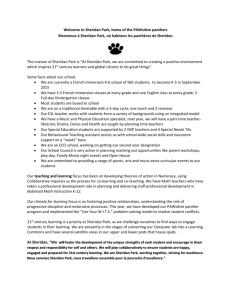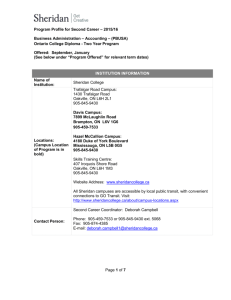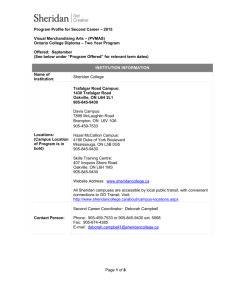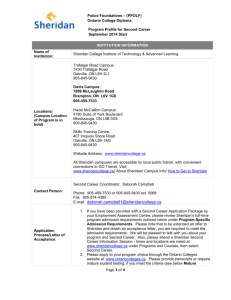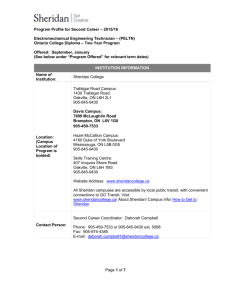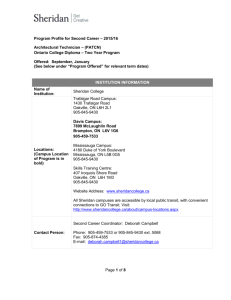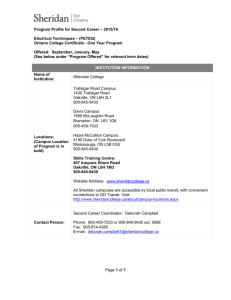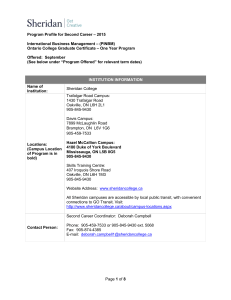Social Service Worker – (PSSWK) Ontario College Diploma
advertisement
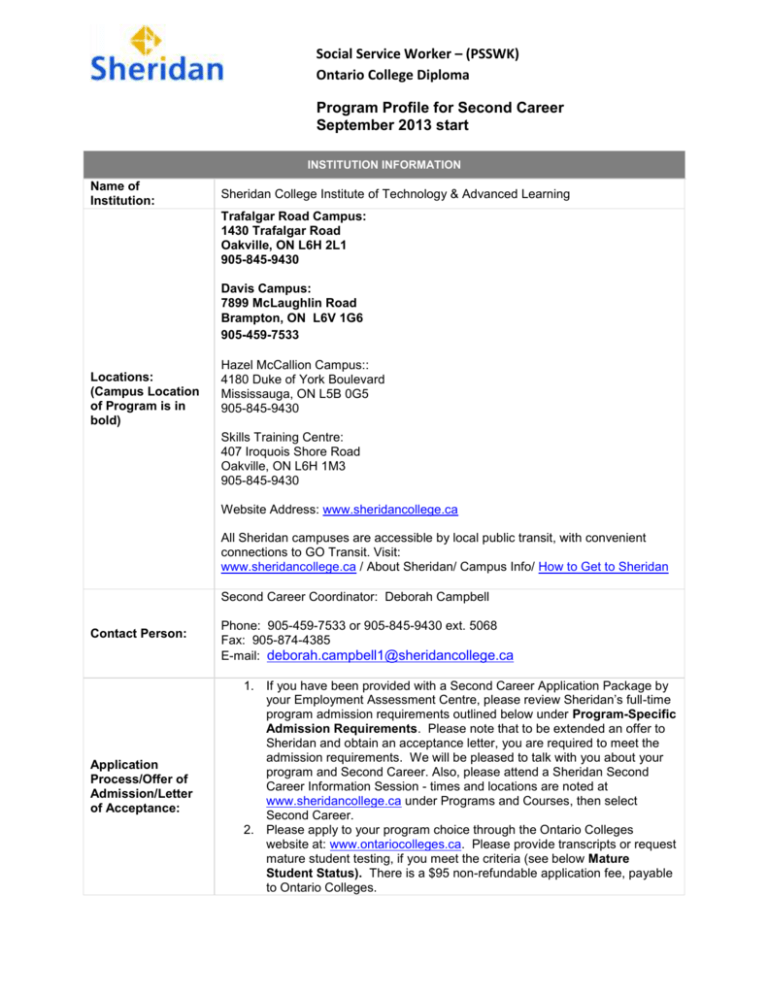
Social Service Worker – (PSSWK) Ontario College Diploma Program Profile for Second Career September 2013 start INSTITUTION INFORMATION Name of Institution: Sheridan College Institute of Technology & Advanced Learning Trafalgar Road Campus: 1430 Trafalgar Road Oakville, ON L6H 2L1 905-845-9430 Davis Campus: 7899 McLaughlin Road Brampton, ON L6V 1G6 905-459-7533 Locations: (Campus Location of Program is in bold) Hazel McCallion Campus:: 4180 Duke of York Boulevard Mississauga, ON L5B 0G5 905-845-9430 Skills Training Centre: 407 Iroquois Shore Road Oakville, ON L6H 1M3 905-845-9430 Website Address: www.sheridancollege.ca All Sheridan campuses are accessible by local public transit, with convenient connections to GO Transit. Visit: www.sheridancollege.ca / About Sheridan/ Campus Info/ How to Get to Sheridan Second Career Coordinator: Deborah Campbell Contact Person: Application Process/Offer of Admission/Letter of Acceptance: Phone: 905-459-7533 or 905-845-9430 ext. 5068 Fax: 905-874-4385 E-mail: deborah.campbell1@sheridancollege.ca 1. If you have been provided with a Second Career Application Package by your Employment Assessment Centre, please review Sheridan’s full-time program admission requirements outlined below under Program-Specific Admission Requirements. Please note that to be extended an offer to Sheridan and obtain an acceptance letter, you are required to meet the admission requirements. We will be pleased to talk with you about your program and Second Career. Also, please attend a Sheridan Second Career Information Session - times and locations are noted at www.sheridancollege.ca under Programs and Courses, then select Second Career. 2. Please apply to your program choice through the Ontario Colleges website at: www.ontariocolleges.ca. Please provide transcripts or request mature student testing, if you meet the criteria (see below Mature Student Status). There is a $95 non-refundable application fee, payable to Ontario Colleges. Social Service Worker – (PSSWK) Ontario College Diploma Program Profile for Second Career September 2013 start 3. If Sheridan determines you do not meet the admission requirements through transcripts or testing, we will provide you with information about how you can most efficiently obtain the necessary prerequisites through Sheridan’s Upgrading or ESL Programs. 4. If you are accepted into your program choice, you will receive an offer of admission and, subsequently, a detailed acceptance letter, which you will submit with your Second Career funding application. Certification of School: Sheridan is an Ontario Public College and is certified to issue T2202A tax receipts. Sheridan recognizes that some students who enter a program at the College will have earned postsecondary credits at other recognized postsecondary institutions and may wish to apply these credits towards the Sheridan credential. Advanced standing refers to the transferring of credit earned at another recognized postsecondary institution towards a Sheridan credential. Students may apply to receive advanced standing for specific Sheridan course(s) based on the successful completion of similar courses at other recognized postsecondary institutions subject to meeting applicable Sheridan policies. Advanced Standing: Candidates must have achieved a minimum course grade of C grade in the course that is being considered for advanced standing, or the minimum pass for the course for promotion within the program, whichever is higher. Courses considered for advanced standing must have been completed within five years prior to the request except with the permission of the Dean of the respective school. Please refer to the full time Advanced Standing policy on Sheridan’s Policies and Procedures website for specific details. Mac users please note: you must use Firefox, Opera or Netscape to access the documents on the Policies and Procedures website. PROGRAM INFORMATION Program Name/Credential: Social Service Worker Ontario Secondary School Diploma or equivalent, including these required courses: Program-Specific Admission Requirements: One English, Grade 12 (ENG4C or ENG4U) Or, Mature Student Status – Mature students do not possess an Ontario Secondary School Diploma, or equivalent, and are 19 years of age or older before the starting date of the program. Mature students who apply to Sheridan’s certificate and diploma programs must Social Service Worker – (PSSWK) Ontario College Diploma Program Profile for Second Career September 2013 start demonstrate their ability to work at the postsecondary level in one of the following two ways: By successfully completing equivalency testing in English and/or mathematics and/or; science or By completing a program of academic upgrading at a level appropriate to the program of choice.* Mature students must demonstrate proficiency in meeting specific program prerequisites. *If you do not have the required prerequisites, you may wish to enrol in Sheridan’s Academic Upgrading program to obtain equivalent credits. Sheridan also offers an ESL program. Preparatory training, such as academic upgrading, is eligible for Second Career funding, subject to the approval of Employment Ontario. APPLICANT SELECTION Eligible applicants will be selected on the basis of previous academic achievement (the average of their six highest senior-level credits, including the required course(s). Applicants who do not meet the admission requirements for this program will be assessed and advised individually and may be considered for other, related programs. Preparation for Application Related volunteer and/or part time employment in a social service setting or with older adults is highly encouraged. Criminal Record Check and Immunization Requirements Sheridan field placement agencies may require a police record check for criminal offences, a vulnerable sector check and/or a current acceptable record of immunization. Students will be required to provide this documentation directly to their field placement prior to the start of the placement and at their own expense. Students who cannot meet these requirements may have limited field placement opportunities. A blank immunization form can be found at: healthforms.sheridancollege.ca Start/End dates by semester: September 2013 Start Program Length/ Hours/Weeks: Sept. 3, 2013 1 To Dec. 13, 2013 Jan. 6, 2014 2 To April 17, 2014 Sept. 2, 2014 3 To Dec. 12, 2014 Jan. 5, 2015 4 To April 17, 2015 This is a full time program over 2 years: (4 semesters of 14 weeks each) Hours per week: 21 (daytime hours between 8:00 a.m. and 6:00 p.m., Monday to Friday) Social Service Worker – (PSSWK) Ontario College Diploma Program Profile for Second Career September 2013 start Approximate hours of hands on training: Semester three: Students are in placement for 3 days a week and will accumulate 300 hours. Semester four: Students will continue in the same placement for 3 days a week and will accumulate 300 hours. Total: 600 hours Two Year Program Programs starting in September have a four month break over the summer (from approximately mid-April to end of August) between first and second year. The Christmas break is approximately 3 weeks, and breaks between semesters are 2 weeks. Programs starting in January and May run continuously over 16 months (no summer break). The Christmas break is approximately 3 weeks, and breaks between semesters are 2 weeks. Students will be notified about their class schedule and timetable prior to the beginning of each semester. Class Size: Approx. 35 Course Outline: See Program Outline section below Registration Fee – (applicable at time of publication – subject to change without notice): The $95 non-refundable application processing fee paid to Ontario Colleges covers application processing for one application cycle. Annual Tuition (2012/13) – (applicable at time of publication – subject to change without notice): • Year One: $3,568.00 Tuition fees are regulated by the Ministry of Training, Colleges and Universities. *Tuition for programs starting September 2013, and subsequent terms, is subject to increase and will be updated when the increase has been determined. • Year 2: * *By action of the Ontario government, a change may be made to year two tuition. For purposes of your research, please use the year one tuition. Parking (2012/13) – (applicable at time of publication – subject to change without notice): Parking for programs starting September 2013, and subsequent terms, is subject to increase and will be updated when the increase has been determined. • One Month: $80.00 • One Semester (September to January): $186.00 • Two Semesters (September to May): $343.00 • Three Semesters (September to August): $410.00 Social Service Worker – (PSSWK) Ontario College Diploma Program Profile for Second Career September 2013 start Additional Costs 2012/13 – (applicable at time of publication – subject to change without notice): Cost for books, etc. for programs starting September 2013, and subsequent terms, is subject to increase and will be updated when the increase has been determined. Year 1 Books: $468.00 Expendable Supplies: $373.00 Uniform and Equipment: $136.00 Field Trips: $145.00 Year 2 (subject to increase) Books: $468.00 Expendable Supplies: $373.00 Uniform and Equipment: $132.00 Field Trips: $267.00 See “Other” below Other: Payment Policy for Second Career: Refund/Withdrawal Policy: Criminal Record Check and Immunization Requirements Sheridan field placement agencies may require a police record check for criminal offences, a vulnerable sector check and/or a current acceptable record of immunization. Students will be required to provide this documentation directly to their field placement prior to the start of the placement and at their own expense. Students who cannot meet these requirements may have limited field placement opportunities. A blank immunization form can be found at: Healthforms Option 1: Payment of total fees for one full year should be paid in full by the tuition deadline. Please refer to your Fees Invoice for tuition deadlines as deadlines vary depending on when you are extended and accept an offer. To officially withdraw from Sheridan full time programs, you must do so in writing by submitting to the Office of the Registrar an “Application for Term or Complete Program Withdrawal” form available at all Sheridan Student Advisement offices. If you withdraw by the tenth scheduled day of the term, then all fees are refunded for that term, minus a $100 administrative processing charge. Sheridan’s Social Service Worker Program provides you with the skills and knowledge to help struggling people work through their challenges and enjoy more stable and satisfying lives. This award-winning program prepares you to: Your Second Career in Social Services: Conduct effective assessments Manage interventions Develop evaluation strategies relevant to the clients' needs Work with government agencies to navigate regulations Become fully aware of the services available and how to deliver them Understand the scope of your practice and when (and where) to refer clients Social Service Worker – (PSSWK) Ontario College Diploma Program Profile for Second Career September 2013 start Opportunities Working in: Career opportunities/ Employment Prospects/Success Factors: Recreation programs Drop-in centres Centres for the developmentally challenged Group home and mental health settings Crisis centres Centres for abused women Community centres Food banks Homeless shelters Alumni of Sheridan can access all in-person and web-site Career Centre’s services for assistance in Career Counselling and Employment Advising for one year after their graduation date. After one year, they can access all web-site services including jobs.sheridan (our on-line job posting system). Method of Instruction: Equipment Availability: Instructor Qualifications: Courses are instructor-led. Students will engage in a variety of applied learning and experiential activities and will complete multiple industry projects. Students will have access to computers in open access computer labs. College faculty are hired based on a combination of industry experience and academic qualifications. Most full-time faculty have relevant Master’s degrees and/or professional certifications where applicable to their field of expertise. Faculty are provided with opportunities to engage in professional development to ensure currency in their field as well as proficiency in teaching adults. All Sheridan’s programs are designed and kept up to date with input from Program Advisory Committees that include representation from employers and industry organizations. Curriculum Design: Network for Innovation & Leadership in Education at Sheridan (NILES) at Sheridan oversees the design of new programs and courses and maintains a schedule of program review to keep programs up to date. Students have the opportunity to complete a formal evaluation of the course and instructor at the end of each course. Evaluation of Instructors, Courses and Programs: Physical Facilities: In addition, students can participate in the Student Satisfaction Survey to evaluate their program. Public colleges must survey students, graduates and employers as mandated by the Ministry of Training, Colleges and Universities to obtain information on Key Performance Indicators (KPIs). Please visit Please visit: Sheridan Home Page, About Sheridan, Sheridan at a Glance, Key Performance Indicators (KPIs). Sheridan classrooms and campus facilities are accessible and are designed to support a wide range of applied learning activities. Classrooms and labs are Social Service Worker – (PSSWK) Ontario College Diploma Program Profile for Second Career September 2013 start equipped with modern technology, including digital AV teaching and learning aids. At the Davis and Trafalgar Road campuses, gyms and fitness centres, full-service cafeterias, modern learning resource centres and vibrant student centres contribute to supporting student learning and life. Both campuses have attractive grounds that provide a relaxing counterpoint to the hustle and bustle of student activity. As a public college, Sheridan is able to offer a full range of student services and supports: Athletics and Recreation Career Centre (job search assistance): available for one year following graduation Counselling and Special Needs Services Additional Supports and Resources Available: Accessible Learning Services Library Services Peer Tutoring and Mentoring Health Services Student Advisement Centre Student Union Special Accommodations: Sheridan’s Accessible Learning Services facilitates equal access for eligible students with disabilities by coordinating reasonable academic accommodations and support services. Accommodation plans and services are tailored to correspond with the disability related needs of each student and are determined based on the documentation provided and program specific requirements. Social Service Worker – (PSSWK) Ontario College Diploma Program Profile for Second Career September 2013 start PROGRAM OUTLINE Course Requirements: Course code: Course Name: Hours / week: Semester 1: CSRV 17749 Social Service Work Foundations 3 CSRV 10703 Dimensions of Teams and Small Groups 3 FLPL 16886 Introduction to Social Services and Field Practicum 3 CSRV17062 Introduction to Community Development 3 PSYC 17967 Psychology Core Concepts 3 COMM 19999 Essential Communication Skills 3 CSRV13672 Social Diversity in Contemporary Canada TOTAL HOURS PER WEEK 21 CSRV 22987 Concept of Helping 3 SOCS16732 Human Development: Lifespan 3 CSRV 10261 Social Justice and Social Change 3 FLPL 13672 Field Preparation: SSW 6 GNED General Education Elective 3 CSRV 10919 Introduction to Social Policy 3 TOTAL HOURS PER WEEK 21 PSYC 24454 Psychology: Maladaptive Behaviour 3 CSRV 21618 Helping Models and Strategies 1 3 CSRV 21425 Group Work Methods 3 FLPL25288 Professional Practice 1: SSW 2 Semester 2: Semester 3: Social Service Worker – (PSSWK) Ontario College Diploma Program Profile for Second Career September 2013 start TOTAL HOURS PER WEEK 20 CSRV 24947 Helping Models and Strategies 2 3 CSRV 21011 Research Issues in Social Services 3 FLPL20065 Professional Practice 2 11 GNED General Education 3 TOTAL HOURS PER WEEK 20 Semester 4: COURSE DESCRIPTIONS COURSE Social Service Work Foundations Code: CSRV 17749 Hours / wk: 3 Students in this course examine the core values, roles and skills of social service work. Students are introduced to both a theoretical perspective and communication skills as they impact on areas such as self-concept, feelings and perceptions. Students apply this knowledge to both themselves and prospective client groups as they relate these areas to their growth as professionals. In addition, students practice the helping skills necessary for establishing a relationship with clients, caregivers and colleagues.. COURSE Dimensions of Teams and Small Groups Code: CSRV 10703 Hours / wk: 3 This course provides students with opportunities to acquire the knowledge and develop the skills and attitudes needed to maximize their ability to function effectively in small teams in a variety of settings appropriate to the Social Service Worker profession. Students develop an understanding of their own personality and learning styles and how this affects their perceptions of themselves and others as team members. In addition, students learn time management, stress management, goal setting, effective communication skills and cooperative learning. Through interactive lecture, discussion, small group activities and an examination of case studies, students examine the components of effective small group and team functioning, and the effect of technology on team functioning. COURSE Introduction to Social Services and Field Practicum Code: FLPL 16886 Hours / wk: 3 Once students understand the historical development of the social service profession they will be prepared to examine the nature of this field in the economic, social and political realities of the 21st century. Students will be asked to research social service agencies in the community as well as learn how to refer clients to programs and services available. Professional documentation and report writing skills will be developed in this context. Students will develop personal portfolios as a foundation for moving to Social Service Worker – (PSSWK) Ontario College Diploma Program Profile for Second Career September 2013 start professional portfolios in second year. Goal setting is explored and students begin to develop their personal goals as they prepare for practicum experiences in semester 2. COURSE Introduction to Community Development Code: CSRV17062 Hours / wk: 3 Students examine the concept of community development as it relates to the professional practice of social service workers. Topics include theoretical frameworks, relating community change to agency work and professional practice, community profiles and community outreach. Students explore possible interventions along a continuum: from changes in human service work practice and under agency auspices to broader structural change within the community. Through interactive lectures, graded online discussions, seminar and presentations, students acquire information through which community work can be examined while analyzing outreach and development issues and activities.. COURSE Psychology Core Concepts Code: PSYC 17967 Hours / wk: 3 This is an introductory level course in psychology, the science of behaviour and mental processes. Basic concepts, theories and research findings are examined within the biological, behavioural, psychoanalytic, humanistic and cognitive perspectives. Core topics covered will include scientific methodologies, biological foundations of behaviour; learning and memory; language, thinking and intelligence; motivation, emotion and stress, and personality theories. Two optional topics (which vary with each instructor) will also be addressed during the course. COURSE Essential Communication Skills Code: COMM 19999 Hours / wk: 3 Essential Communication Skills is an introduction to college-level English that develops transferable communication skills required by students for both academic and professional success: writing, reading, speaking, presenting, listening and visual literacy. Students become familiar with various writing styles, and course work provides opportunities for students to read, analyze and practice a variety of structures and formats. Students develop critical reading and response strategies, create well-reasoned reports, edit their own work, perform the fundamentals of academic research and give effective oral presentations. Course work includes a variety of learning experiences including lectures, lab work and collaboration. COURSE Social Diversity in Contemporary Canada Code: CSRV 13672 Hours / wk: 3 The most recent Canadian statistical data will be used to understand the current demographic shifts in society. We will examine the causal factors, implications and impact of these changes for diverse populations such as older adults, immigrants and refugees, people with disabilities, gay and lesbian communities, people who experience mental illness, addictions or family violence and Aboriginal Peoples. Students will explore their own identity and culture as well as critically examine intersections of experience by locating self in relation to these diverse populations. This will provide a foundation for an introductory analysis of diverse populations and a more in-depth analysis for the subsequent course Social Service Worker – (PSSWK) Ontario College Diploma Program Profile for Second Career September 2013 start "Social Justice and Social Change" in term two. In addition to a brief discussion of the structural inequalities, students will closely examine the roots of prejudice and discrimination, violence against women, children and elders, and the stigmatization, isolation, alienation and marginalization of those who experience mental illness and addiction. COURSE Concept of Helping Code: CSRV 22987 Hours / wk: 3 This second semester course builds on the basic communication and interviewing skills from the previous semester. It introduces students to the concept of helping as a planned, purposeful process and explores the core helping qualities, values and skills associated with developing and maintaining ethical and effective helping relationships. Utilizing an ecological, holistic, strengths-based approach, the course examines the helping skills associated with the progressive stages of the problem-solving process from engagement to termination. These skills include active listening, validating feelings, clarifying, goalsetting, contracting, confrontation, and reframing. This course emphasizes an integration of theoretical and experiential learning necessary for social service work practice and focuses on distinguishing personal from professional values. Students are given opportunities to examine conflicting values and the complexities of ethical decision making. COURSE Social Justice and Social Change Code: CSRV 10261 Hours / wk: 3 The helping profession is charged with the responsibility of deconstructing complex social injustices in order to determine appropriate strategies for social change. Students will closely examine the roots of racism, sexism, ageism, ableism, heterosexism, capitalism, ethnocentrism, and homophobia as they relate to the Social Diversity in Contemporary Canada in term 1. This will provide a foundation for a more in-depth analysis of structural injustice in Canada. Students will apply social service work theory to understand and intervene in areas of oppression, marginalization and stigmatization of diverse populations. Together we will study the essential strategies to create social justice such as the right to equality and the need for social action and policy change. COURSE Human Development: Lifespan Code: SOCS16732 Hours / wk: 3 This course is designed to provide students with an overview of the major theories of the human development and their application to every day life. Basic concepts, theories and research findings are examined from the biological, cognitive and social perspectives as they apply to human growth and developmental stages from conception to death. Patterns of continuity, challenges and opportunities are examined through a series of learning experiences that include class and group discussion, interactive lecture, web site exploration, video viewing, presentations and written assignments. Students will also have the opportunity to apply human development concepts to their personal lives. Social Service Worker – (PSSWK) Ontario College Diploma Program Profile for Second Career September 2013 start COURSE Field Preparation: SSW Code: FLPL13672 Hours / wk: 6 Students investigate a range of topics and undertake activities to assist them in successfully securing and participating in a field practicum. Students develop and refine the skills necessary to be successful in their field practicum with an emphasis on professionalism, self-awareness, and interpersonal effectiveness. Topics include an overview of the different social service agencies at which students may undertake a practicum, the steps necessary for securing a practicum, working as part of a multi-disciplinary team, the importance and application of documentation in the field, and the roles and responsibilities of students, practicum agencies and the College related to supervision. Students select a stream of second year courses (social service worker, gerontology, immigration and refugee settlement) and explore and secure a practicum within their selected stream. Students complete field applications and obtain medical clearances and criminal reference checks in preparation for participation in a field practicum. COURSE Introduction to Social Policy Code: CSRV 10919 Hours / wk: 3 This course introduces the concept of the social welfare system in Canada and the Province of Ontario. Students become acquainted with the major historical events in the development of the Canadian system, selected pieces of legislation, and sectors in society, including their shortcomings, and strengths. They also acquire practice skills related to researching various current issues, and working in teams to present material to their peers in a professional manner. Through interactive lectures, simulations, research on the web and in person, group work, assignments and tests students discover how the welfare society in Canada functions in terms of its legislation and practice. COURSE General Education Code GNED Hours / wk: 3 COURSE Psychology: Maladaptive Behaviour Code: PSYC 24454 Hours / wk: 3 This course provides students with an understanding of various significant psychological disorders. Theories and research findings including prevalence, age-related differences, familial and cultural context of the disorders are examined from the evolutionary/biological, trait, psychoanalytic, behavioural, humanistic and cognitive perspectives used to explain each disorder and recommend treatments. Topics include: definitional, historical and cultural context, anxiety disorders, mood disorders, personality disorders and schizophrenia. Two or more optional topics from the following list will also be addressed during the course: substance- related disorders, dissociative disorders, somatoform disorders, paraphilias, sexual dysfunction and gender identity disorders, impulse-control disorders, eating disorders, sleep disorders, disorders associated with childhood, disorders associated with aging, and the legal context. Through interactive lecture, discussion and case studies, students examine various disorders and consider empirical research. Students will apply that knowledge to their own lives, the lives of sufferers and their families and communities and to contemporary society. COURSE Helping Models and Strategies 1 Code: CSRV 21618 Hours / wk: 3 Social Service Worker – (PSSWK) Ontario College Diploma Program Profile for Second Career September 2013 start Effective social service work requires the ability to apply theoretical knowledge in a purposeful way to guide practice with clients in a variety of settings and situations. The focus of this second year course is on integrating theory and practice of micro level interventions in the social service field. The first part of the course focuses on using systems and crisis theory in bio- psychosocial-spiritual assessments and integrating the humanistic- existential approach into practice. The second part of the course focuses on systemic and crisis assessment and intervention with various presenting concerns facing social service workers in practice settings (addictions, depression/anxiety/stress, suicide, domestic violence, grief and bereavement, child and elder abuse, compassion fatigue and worker burnout). Readings, lectures, videos, role plays, case studies and experiential learning assignments are used to understand this course material. COURSE Group Work Methods Code: CSRV 21425 Hours / wk: 3 This course provides the student with the experiential development and skilled application of clinical group work and supportive counseling skills required for social service work practice. Students will be introduced to the group context as a model to facilitate change and advance the advocacy role. Various types of groups and other important aspects of group work will be discussed including leadership, dynamics of conflict, power and humour and behaviour contracts. Learning strategies will involve lectures, student role plays and participation in small groups. COURSE Professional Practice 1 Code: FLPL25288 Hours / wk: 11 COURSE Helping Models and Strategies 2 Code: CSRV 24947 Hours / wk: 3 Study both traditional and alternative models of helping in order to develop a diverse repertoire of skills required for the social service field. COURSE Research Issues in Social Services Code: CSRV 21011 Hours / wk: 3 This course offers students the opportunity to explore, in depth, selected topics of interest and relevance to social service professionals. These topics may include, among others, gerontological issues, advocacy, domestic violence and alternate approaches to helping. Teaching strategies will incorporate focus groups to research contemporary issues, film reviews, lectures and small group work. Social Service Worker – (PSSWK) Ontario College Diploma Program Profile for Second Career September 2013 start COURSE Professional Practice 2 Code: FLPL20065 Hours / wk: 11 COURSE General Education Code GNED Hours / wk: 3 ADDITIONAL NOTES All information current at time of publication - subject to change without notice.
